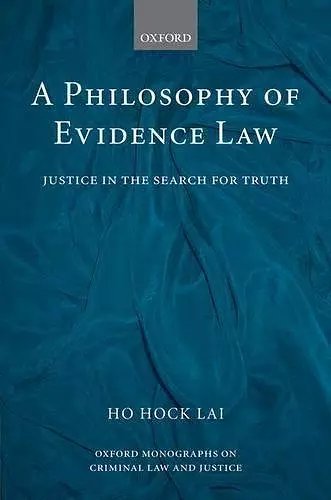A Philosophy of Evidence Law
Justice in the Search for Truth
Format:Hardback
Publisher:Oxford University Press
Published:6th Mar '08
Currently unavailable, and unfortunately no date known when it will be back

The dominant approach to evaluating the law on evidence and proof focuses on how the trial system should be structured to guard against error. This book argues instead that complex and intertwining moral and epistemic considerations come into view when departing from the standpoint of a detached observer and taking the perspective of the person responsible for making findings of fact. Ho contends that it is only by exploring the nature and content of deliberative responsibility that the role and purpose of much of the law can be fully understood. In many cases, values other than truth have to be respected, not simply as side-constraints, but as values which are internal to the nature and purpose of the trial. A party does not merely have a right that the substantive law be correctly applied to objectively true findings of fact, and a right to have the case tried under rationally structured rules. The party has, more broadly, a right to a just verdict, where justice must be understood to incorporate a moral evaluation of the process which led to the outcome. Ho argues that there is an important sense in which truth and justice are not opposing considerations; rather, principles of one kind reinforce demands of the other. This book argues that the court must not only find the truth to do justice, it must do justice in finding the truth.
Ho's book A Philosophy of Evidence Law is an important contribution to this emerging body of literature at the interface between evidence scholarship and philosophy. This monograph is an excellent exemplar of this kind of interdisciplinary work, as it combines a deep understanding of the law of evidence with rigorous philosophical analysis, and it succeeds in showing the relevance of abstract theory to the detailed study of evidence rules and legal problems. The book is also to be commended for its breath of analysis, for it examines evidence rules of both criminal and civil law in several common law jurisdictions, with a foray into international law and continental law. * Amaya, Amalia (2009) "The Ethics of Trial Deliberation: Moral Agency in Legal Fact-Finding," International Commentary on Evidence: Vol. 7 : Iss. 2, Article 2 *
Ho is admirably clear and eloquent in patiently setting out his stall and defending his thesis...It is compellingly written, and arguments are carefully cross-referenced. As a normative critique of the law of evidence, it deserves to take its place alongside recent well-known works such as Alex Stein's Foundations of Evidence Law...and Larry Laudan's Truth, Error, and Criminal Law...A Philosophy of Evidence Law: Justice in the Search for Truth is an impressive work of scholarship. * Andrew L-T Choo, The Edinburgh Law Review, Volume 13, 2009 *
In summary the book embodies vast learning, makes many acute points, and in so doing has driven some of the piles preparatory to the task of bridging the gap between theory and practice in the law of evidence. * Professor Colin Tapper, Law Quarterly Review, 2009 *
Ho's book is important and well worth study by evidence scholars and others interested in the morality and epistemology of legal fact-finding. * William E. O'Brian Jr, The Modern Law Review 72 (1) *
This is a scholarly, well-researched and thought provoking work, providing an excellent introduction to the theoretical underpinnings of evidence law. * Andrew C. Stumer, International Commentary on Evidence, Vol 6, Issue 1 *
Ho has written an erudite and timely text that lawyers and judges ought to consider reading to enhance the proper working of the judicial system, especially in the age of digital evidence * Stephen Mason, ICLQ, Vol 58 *
ISBN: 9780199228300
Dimensions: 242mm x 163mm x 26mm
Weight: 706g
368 pages